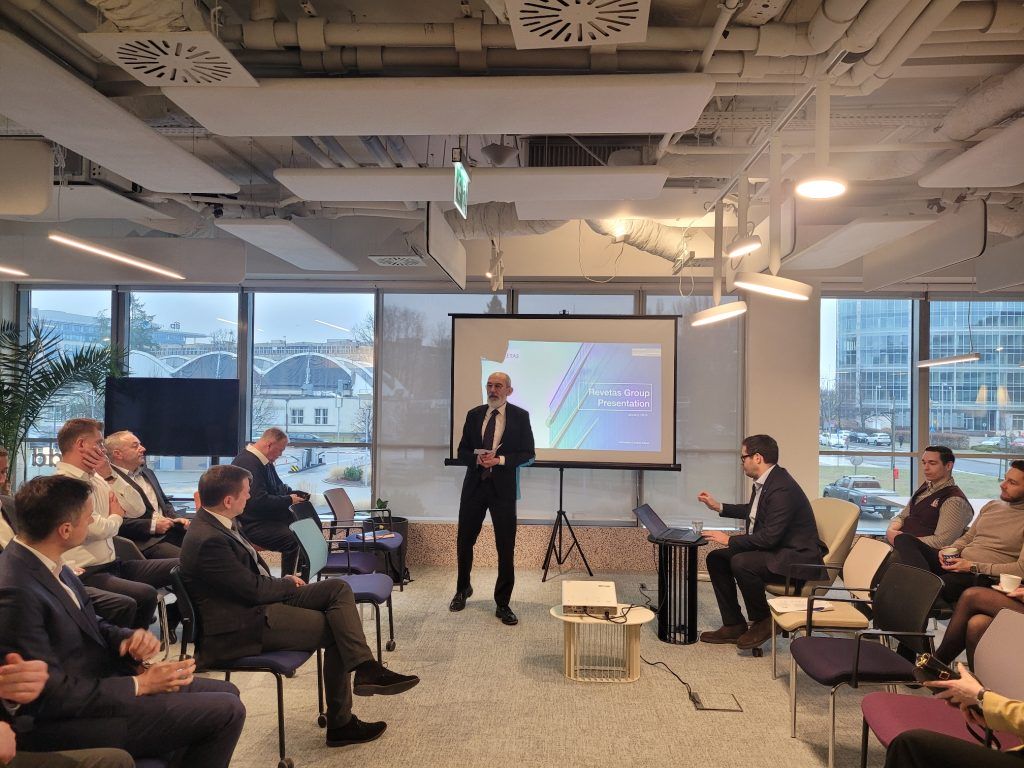The BPCC’s Real Estate & Construction Group met for the first time this year for a round-table discussion about prospects for the sector in 2024. Hosted by real estate investor Revetas, the meeting took place in the Trinity One development in Warsaw on 1 February 2024.
The event was opened by Antonio Pomes, director – country head of portfolio management for Poland at Revetas Asset Management, which has invested in BPCC member, Bonarka 4 Business, an office complex in Kraków.
The event attracted a record numbers of participants – architects, building-material producers, civil engineers, contractors, developers, financiers, insurers, investors, landlords, lawyers, real-estate agents and tax advisers – to discuss the state of trade in the sector from different points of view. The cross-disciplinary viewpoints built up to a complex and detailed picture of how the sector is likely to develop after a tough year, which saw a significant drop in foreign direct investment into Poland.
In the round-table discussion moderated by the BPCC’s chief advisor Michael Dembinski, each participant was invited to give a brief picture of how they saw the state of trade in their business, their perception of market sentiments and sectoral trends. Taken together, the meeting offered a unique overview of what can be expected in real estate & construction this year. The meeting was held as always under the Chatham House rule, which increases the openness of the discussion.
Key conclusions:
- 2024 will be a better year than 2023, with a slow start and acceleration in Q3 and Q4
- Investors are waiting for three areas of uncertainty to ease – the high cost of borrowing, the policy programme of the new government, and the situation in Ukraine
- Interest rates are expected to be lower towards the end of 2024; cost of finance remains a major barrier to investors
- EU funds from the Recovery and Resilience Facility (KPO in Polish) will create a huge boost to infrastructure and energy projects, driving up construction prices as a consequence
- The CPK (‘Solidarity Transport Hub’) project’s future is currently unknown – will it be modified, stopped all together, or given the green light?
- Residential development is in demand, especially the private-rented sector, student accommodation, and senior-living projects, albeit all from low levels
- Data centres have large potential for Poland, but investors are looking to the new Polish government to accelerate green energy projects to provide power for them
- Small modular reactors as seen as an essential part of Poland’s move away from fossil fuels
- Prospects for the office sector remain mixed as employers are finding it harder to get employees to return to the workplace; quality offices in prime locations remain in demand
- Smaller Polish towns (30,000 – 100,000 population) are seen as good locations for modern retail development
- Green building is in demand with the introduction of the Corporate Sustainability Reporting Directive mandating large companies to report their environmental impact
- Banks are paying attention to ESG and unwilling to lend money against real-estate assets that don’t comply with current environmental standards
- Retrofitting and repurposing older buildings is fast becoming commonplace
- Land banks are being built up on both greenfield and brownfield sites






























